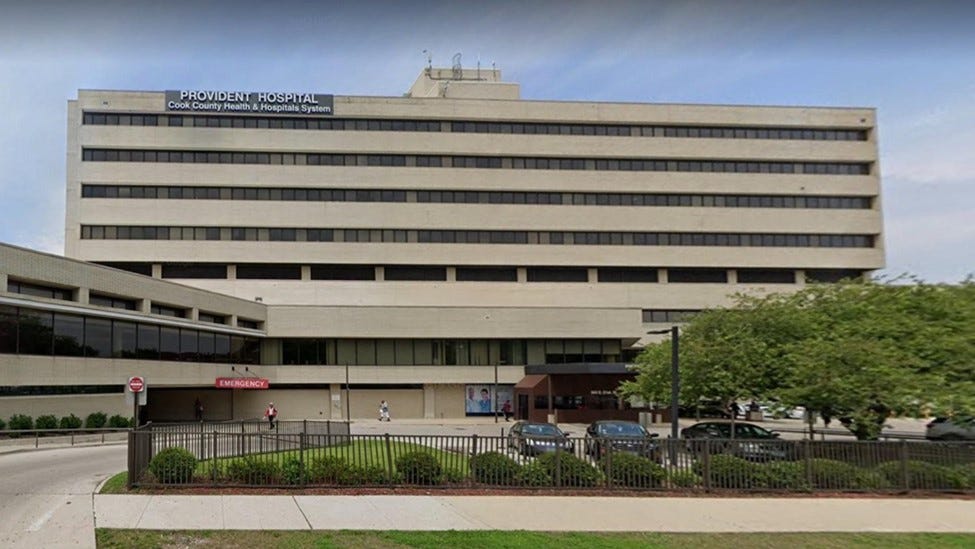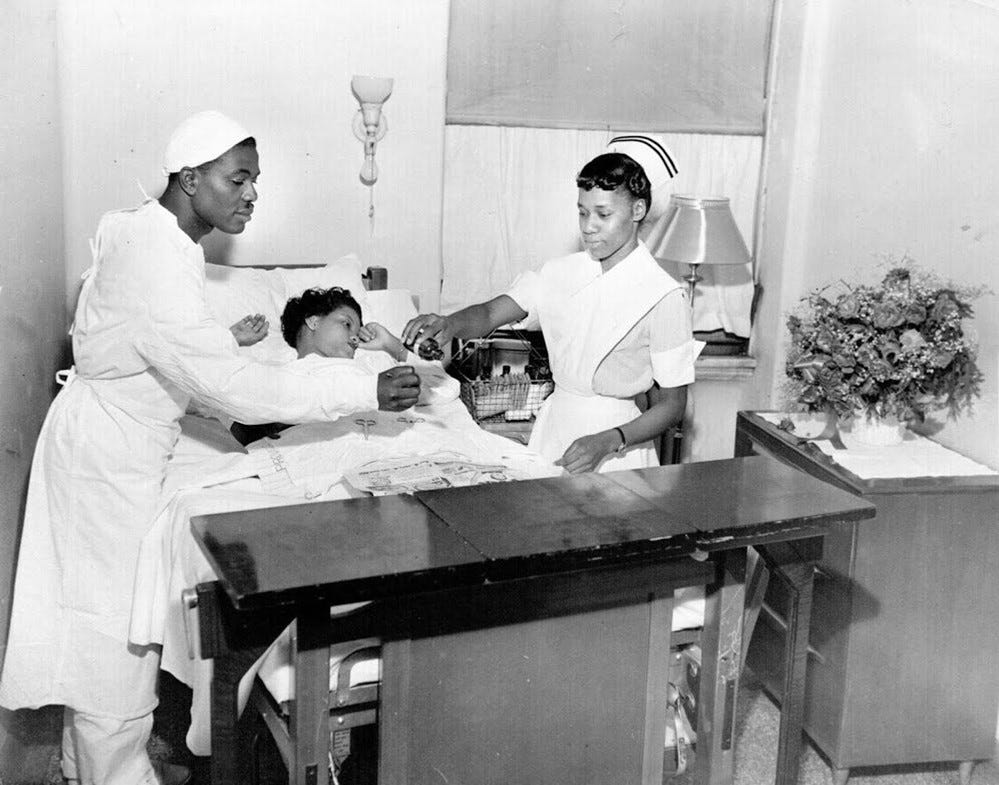Can someone PLEASE explain something to me? When did “White” people become SO important?

The year was 1966. Gym class, led and taught by Mr. Greene, at Hales Franciscan High School, in Chicago, which had an all-Black student body, had just ended. “Take your time to the locker room, boys,” Mr. Greene had routinely ordered, as he ducked into a side door, in the gym, to put some equipment away.
“Take your time” was a wasteful order that no 16-year old boys were going to adhere to. As soon as Mr. Greene ducked into that side door, the “fun” of running, chasing, and knocking each other out of the way, began. I was tall — too tall for what was about to happen.
I ran as fast as I could, if for no other reason than to duck William Quarrels, the bully that, the next week, I would finally stand up to and say, “No. No more ‘lunch money’ for you.” I was dead — or so I’d thought. But, instead of threatening me, or straight up whup’n my ass, he said, “Uhh…Say what?” I repeated the new rule, feigning, as best I could, a new found fearlessness. It was actually theatre.
My big brother, Marcus, who had a street rep of having knocked out three dudes at once, in a fistfight on 63rd & Cottage Grove, had taught me theatre: “Sometimes, like, if I ain’t in the mood for humbug’n with a nigguh, I’ll get in the chump’s face, and quietly, in a calm, low voice, say, ‘Now, you need to think about this: Whatchu gone look like, going to yo woman’s crib, with no teeth?’”
Would it work? It worked!! Quarrels looked at me, his face the blank face of death. But then, to my extremely pleasant surprise, he copped a huge smile, slapped me on my shoulder, and said, “CHIZ!!! (my nickname then) MY MAN!!!” And from them on, I was able to keep my lunch money. I’d earned Quarrles’ respect. Theatre had worked.
Anyway, I’m running fast, through the doorway that led to the locker room downstairs. I was the first out of the gym, and decided to skip walking down all the steps, choosing, instead, to jump to the next landing. Big mistake. My anxiousness to be “first” blinded me, I guess, to a certain reality: the landing above.
I was now lying on my back, in a daze. When I sat up, blood ran down my face, and I heard someone holler, “Somebody get Mr. Greene!! Chiz is f*cked up!!” Blood was gushing out of my forehead. Mr. Greene finally arrived with a damp towel, wrapped it around my head, pulled me up and walked me outside to his car.
He drove me to Provident Hospital, which, at that time, was all-Black. It might still be, I don’t know. I was nervous. I had played super hard, as a kid, and was used to hard knocks. But not to blood running down my face. That was new.
So, I’m in a hospital room. Two Black nurses are attending to me, and I’m still nervous, almost feeling to panic. One of the nurses comes over to me, sticks a needle somewhere near the wound, to deaden the area, while at the same time, going, “Girl, did you hear about Willie,” she said to the other Black nurse, who responded, “Who didn’t. But, you know Willie. He ain’t no good.”
“Yeah, girl, but that was some raw stuff he did to Mildred. I mean, I’d have kicked his ass OUT!!” Within less that a couple of minutes, I was lying there so calmly that I wanted to panic, because the calmness didn’t make any sense. ‘Why do I feel so calm,’ I thought. I began to think, restfully, about that baseball game that me, Ralph, Jimmy, Shot, Nasty, Warren, Fantroy, Glenn, and Chucky were going to play against some dudes on 55th Street, over in Washington Park.
I was now being stitched up by the other nurse. “Mildred just too weak. But I told her Willie wasn’t no good. He don’t DO noth’n but hang out in the pool hall. Girl, do you know that that fool tried to hit on me, with his ugly, no-job ass?” Now I was holding back laughter. Soon, I would actually be sleepy.
It wasn’t until some years after I’d graduated, in 1968, that it finally came to me why I’d been so calm while at Provident getting stitches: the professionalism of those Black nurses, as well as the peace of mind of being with people I was familiar with — my people: Black people. There is absolutely no doubt whatsoever, in my mind, that those nurses consciously understood that the best way to handle the situation was to be themselves while at the same time doing what they had been trained to do: administer highly professional service to a patient. They were some cool sisters!!!
But Provident Hospital was just par for the course, in the Black community of the south side of Chicago, back then, where other forms of high professionalism, security, stability, surety, existed in other Black institutions, such as the other Black-owned and operated hospital in Chicago, Ida Mae Scott, founded by Dr. James M. Scott, a Black man, in the year 1950, in honor of his wife, Ida Mae. And, as I walked the streets of the south side when I was a shorty, aside from Provident and Ida Mae Scott hospitals, I’d see the following:
Doctors offices (Dad never had to take us on the train downtown for our check-ups. We walked to the Black doctor’s office), Black-owned and operated
Dental offices, Black-owned and operated (ditto)
A bank, Black-owned and operated
An insurance company, Black-owned and operated
Two mini-supermarkets, Black-owned and operated
Mom & Pop stores, Black-owned and operated
Live poultry shops, Black-owned and operated
Butcher stores, Black-owned and operated
Two taxi-cab companies, Black-owned and operated (The taxis were called “Jitneys”)
TV (television) repair shops, Black-owned and operated (And some made house calls, bringing their tools and repairing your TV in the comfort of your crib).
Restaurants, Black-owned and operated
A boxing gym, Black-owned and operated
A community activity center, Black-owned and operated
Newspapers, such as the Chicago Defender, Black-owned and Operated
Two-parent families
Rare (VERY rare) divorce
NO GUN VIOLENCE
Black political culture in Chicago began in the 1800s. As is recorded in The Encyclopedia of Chicago:
“Chicago’s Black politicians, under the leadership of Ed Wright, Robert R. Jackson, and Oscar DePriest, began to wrest control from white politicians in the predominantly Black Second Ward, initiating the development of the nation’s most powerful Black political organization.”
( http://www.encyclopedia.chicagohistory.org/pages/27.html )
Note that it said “wrest control.” There was no whining, bitching, or blaming. They laid the groundwork that, in time, led to the election of the first Black, and most qualified Mayor in the entire history of Chicago, no matter the race: Harold Washington.
Incidentally, my dad had gone to school with Harold, I think at Phillips High School, in Chicago. Harold looked, to me, like he could get down. So, one day I asked my dad, “Could Harold thump?” My dad, who was an undefeated boxer and professional carpenter, said, “Oh, yeah!! Harold could kick BIG ass!” In Chicago, you’d better!! For my dad, an undefeated boxer, to give Harold that kind of respect, on the thumping tip, was deep.
Harold was known to be a deep intellectual. Dempsey Travis, the famous Black real estate entrepreneur, had said something like, whenever he visited Harold, he could barely get inside the door, for so many books lying around everywhere. Harold was a kick ass intellectual, and could kick some physical ass — big time. “Toxic” manhood, back then, was just manhood.
I could go on and on, but I’ll get to the point, and I’m sorry to have to say this. I see Black youth, today engaged in non-stop, 24/7/365 bitching, whining, and blaming. This is foreign to me, and it’s foreign to the kick-ass, get it done, tough-love ethic of pre-1960s Black America. The building of institutions, as I mentioned above, was occurring all over Black America. What happened?
Why is it that, today, the south side of Chicago is now internationally known as a “war zone,” although it’s actually dangerous sections of the south side, where our youth are murdering each other? Why is it that Black youth, today, including our young, Black intellectuals of the rarefied halls of academia, seem to have ONE mindset: blaming White folks for every damned thing under the sun, rather than adopting the “SHVs” (Strong High Values), as I call them in my free book, Uncle Tom’s Uncle, Second Edition.
https://www.academia.edu/80214543/Uncle_Toms_Uncle_Second_Edition
They’re either blaming White folks for everything, or constantly bitching about the past. This, for me, is absolutely astonishing to witness. And now I’m reading about “micro-aggressions.” OH……….MY…………GOD!!! Is that what the term “snowflake” that I hear people use, on social media, is talking about?! Can’t take anything?! Is that what’s happening? If so, it’s certainly a billion percent antithetical to the strong, pre-1960s culture of the Black parents, Black relatives, Black neighbors, and the Black community at large that made no excuses, dug down deep, seldom if ever bitched, and produced.
In our day, in the 1950s, during segregation, in the minds of our Black parents, Black relatives, Black neighbors, “The White Man” virtually didn’t exist. And I’m not exaggerating. How do you think that generation got so much produced? Certainly not by whining about White folks day in and day out.
If you had slammed the cover of your keyboard down, stomped up to your mamma, and tried to say, “Mamma, the WHITE MAN…,” yada, yada, yada, she’d have slapped you upside your head, and said, “WHAT?! What White man??!! Boy, ain’t no White man on this BLOCK!! GET yo ass back there and finish practicing yo piano!! In fact, put another HOUR in!! You got yo damn nerve, coming up to me with that lip!! I OUGHT to BUST it!!” It was called tough love and discipline, not “abuse.”
So, can someone please tell me: When did White people become SO important?



